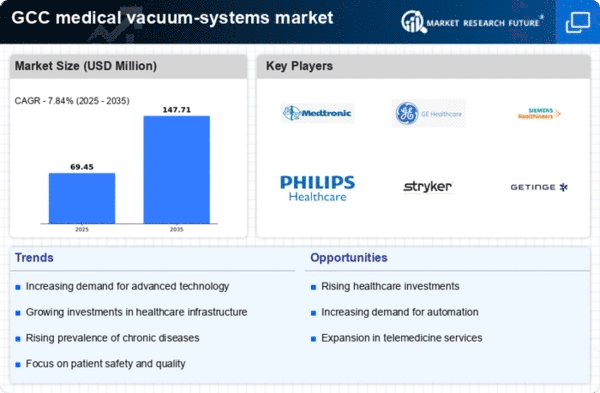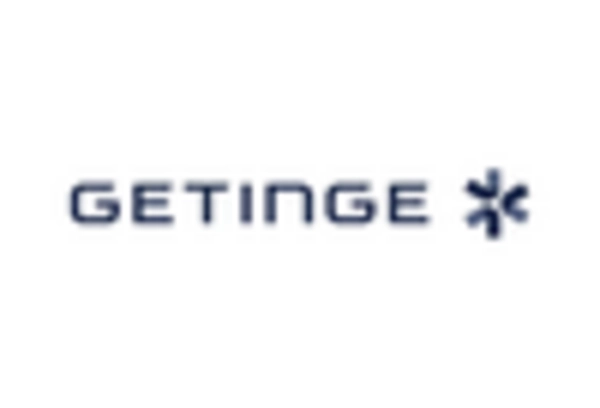Government Initiatives and Funding
Government initiatives and funding play a pivotal role in shaping the medical vacuum-systems market. In the GCC region, various governments are implementing policies aimed at enhancing healthcare quality and accessibility. These initiatives often include financial support for healthcare facilities to upgrade their medical equipment, including vacuum systems. For instance, recent government programs have allocated substantial budgets for healthcare modernization, with some countries earmarking up to $5 billion for healthcare infrastructure improvements. This funding is likely to facilitate the acquisition of advanced medical vacuum systems, thereby driving market growth. As healthcare facilities align with government mandates to improve service delivery, the medical vacuum-systems market is expected to benefit from increased investments and support.
Rising Awareness of Infection Control
The growing awareness of infection control practices among healthcare professionals and patients significantly influences the medical vacuum-systems market. In the GCC region, there is an increasing emphasis on maintaining sterile environments in healthcare settings to prevent hospital-acquired infections (HAIs). Medical vacuum systems play a vital role in infection control by effectively removing contaminants and ensuring a clean surgical field. Recent studies indicate that hospitals implementing stringent infection control measures have reported a reduction in HAIs by up to 30%. This heightened focus on infection prevention is driving healthcare facilities to invest in advanced medical vacuum systems, which are essential for effective waste management and maintaining hygiene standards. As a result, the medical vacuum-systems market is expected to grow as healthcare providers prioritize infection control measures..
Expansion of Healthcare Infrastructure
The expansion of healthcare infrastructure in the GCC region serves as a critical driver for the medical vacuum-systems market. Governments are investing heavily in healthcare facilities, including hospitals and outpatient centers, to meet the growing healthcare needs of their populations. This investment is reflected in the GCC's healthcare expenditure, which is expected to reach approximately $100 billion by 2026. As new healthcare facilities are established, the demand for medical vacuum systems increases, as these systems are integral to maintaining hygiene and safety standards. Furthermore, the integration of advanced technologies in these facilities necessitates the adoption of modern vacuum systems, thereby propelling the market forward. The medical vacuum-systems market is likely to benefit from this infrastructure expansion, as healthcare providers seek to equip their facilities with the latest medical technologies.
Increasing Demand for Surgical Procedures
The medical vacuum-systems market experiences a notable surge in demand due to the increasing number of surgical procedures performed across the GCC region. As healthcare facilities expand and modernize, the need for efficient suction systems becomes paramount. Surgical procedures, including minimally invasive surgeries, require reliable vacuum systems to maintain a sterile environment and ensure patient safety. According to recent data, the number of surgical procedures in the GCC is projected to grow at a CAGR of 6.5% over the next five years. This growth directly correlates with the rising demand for advanced medical vacuum systems, which are essential for effective waste management and fluid removal during surgeries. Consequently, the medical vacuum-systems market is poised for significant growth as healthcare providers invest in state-of-the-art technologies to enhance surgical outcomes.
Technological Innovations in Vacuum Systems
Technological innovations in medical vacuum systems are transforming the landscape of the medical vacuum-systems market. The introduction of smart vacuum systems equipped with advanced monitoring and control features enhances operational efficiency and safety. These innovations allow for real-time monitoring of vacuum levels and automatic adjustments, ensuring optimal performance during surgical procedures. The GCC region is witnessing a shift towards these technologically advanced systems, driven by the need for improved patient outcomes and operational efficiency. Market data suggests that the adoption of smart vacuum systems could increase by 25% over the next few years, as healthcare providers recognize the benefits of integrating technology into their operations. Consequently, the medical vacuum-systems market is likely to expand as facilities seek to adopt these cutting-edge solutions.
















